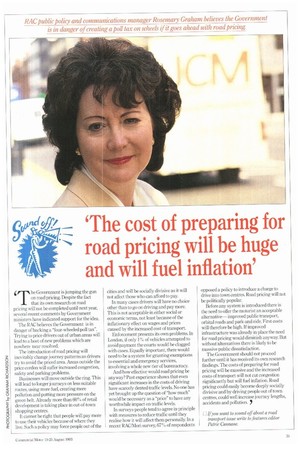'The cost of preparing for road pricing will be huge and will fuel inflation'
Page 39

If you've noticed an error in this article please click here to report it so we can fix it.
C he Government is jumping the gun
on road pricing. Despite the fact that its own research on road pricing will not be completed until next year, several recent comments by Government ministers have indicated support for the idea.
The RAC believes the Government is in danger of backing a "four-wheeled poll tax". Trying to price drivers out of urban areas will lead to a host of new problems which are nowhere near resolved.
The introduction of road pricing will inevitably change journey patterns as drivers try to avoid the priced area. Areas outside the price cordon will suffer increased congestion, safety and parking problems.
Businesses will move outside the ring. This will lead to longer journeys on less suitable routes, using more fuel, creating more pollution and putting more pressure on the green belt. Already more than 60% of retail development is taking place in out-of-town shopping centres.
It cannot be right that people will pay more to use their vehicles because of where they , live. Such a policy may force people out of the
L____
cities and will be socially divisive as it will not affect those who can afford to pay.
In many cases drivers will have no choice other than to go on driving and pay more. This is not acceptable in either social or economic terms, not least because of the inflationary effect on wages and prices caused by the increased cost of transport.
Enforcement presents its own problems. In London, if only I% of vehicles attempted to avoid payment the courts would be clogged with cases. Equally important, there would need to be a system for granting exemptions to essential and emergency services, involving a whole new tier of bureaucracy.
And how effective would road pricing be anyway? Past experience shows that even significant increases in the costs of driving have scarcely dented traffic levels. No one has yet brought up the question of "how much" would be necessary as a "price" to have any worthwhile impact on traffic levels.
In surveys people tend to agree in principle with measures to reduce traffic until they realise how it will affect them personally. In a recent RAC/Mori survey, 67% of respondents opposed a policy to introduce a charge to drive into town centres. Road pricing will not be politically popular.
Before any system is introduced there is the need to offer the motorist an acceptable alternative— improved public transport, orbital roads and park-and-ride. First costs will therefore be high. If improved infrastructure was already in place the need for road pricing would diminish anyway. But without alternatives there is likely to be massive public dissatisfaction.
The Government should not proceed further until it has received its own research findings. The costs of preparing for road pricing will be massive and the increased costs of transport will not cut congestion significantly but will fuel inflation. Road pricing could easily become deeply socially divisive and by driving people out of town centres, could well increase journey lengths, accidents and pollution.
i If you. want to sound off about a road transport issue write to features editor Patric Cunnane.
















































































